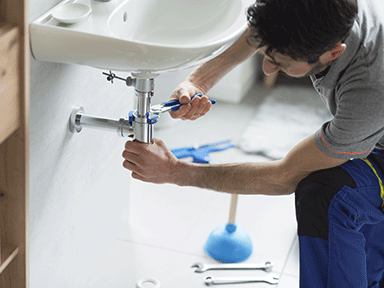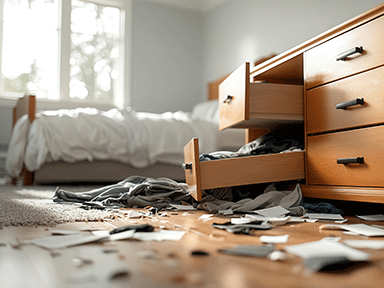If you get a call from your tenants complaining that they can smell gas at the rental, then you’re going to need to know what to do…
Australian homes have relied on gas for cooking and heating for generations. Gas Energy Australia reports that almost 70 per cent of Australian homes use mains or bottled gas for heating, cooking and hot water, and it is estimated that there are more than 18 million residential gas appliances in use across the country.
There’s no doubt gas is a staple in many homes, including rentals. But what can happen if things go wrong?
The impacts of a gas leak
A gas leak has the potential to not only put your tenants’ health at risk, but also your investment property. While natural gas is non-toxic, when it mixes in air in higher proportions it causes oxygen deficiency and becomes dangerous for human health. Gas is also extremely flammable and could cause an explosion or fire.
What can cause a gas leak?
A gas leak occurs when gas unintentionally escapes from a pipeline or bottle. This can happen for several reasons including damage or deterioration to the pipeline, pipework or appliances, fitting and connection issues, poor appliance installation, incorrect handling of gas appliances, appliance malfunctions and lack of maintenance.
Signs of a gas leak
Aside from the obvious smell, other warning signs of a gas leak include:
-
Hissing sounds near any gas line or appliances.
-
Visible damage to gas connections.
-
Unusual air movement like bubbles in standing water.
-
White or dust cloud near gas lines or appliances.
-
Dying or wilting plants/grass near gas lines, indoors or outdoors.
-
Gas appliances with yellow or orange flames instead of blue.
-
A pilot light that keeps going out.
-
Sudden increase in the gas bill without a clear reason.
Tenants may also be experiencing some signs of exposure to gas such as:
-
headaches;
-
dizziness;
-
nausea;
-
fatigue; and
-
eye irritation.
Gas leaks – an emergency repair
It’s important to remember that serious gas leaks are considered emergency repairs under the residential tenancy act in every state and territory in Australia and must be repaired within legislated timeframes. Failing to do so, can put the landlord and property manager in trouble with the law – and insurance cover at risk (if there is a valid claim associated with the gas leak).
Unlike a gas leak in your own home, you aren’t on-site at your rental to ascertain how serious it might be or where it is stemming from. Because of your duty of care, you need to err on the side of caution and can’t ask the tenant to investigate the source of the leak as you might.
If there is a major gas leak or lives are at risk, your tenants should get out and call 000.
What to do if the smell is outside the home
-
Advise the tenants to keep away from the area.
-
If your rental is within a strata-titled complex, notify the strata manager.
-
Call your gas emergency contact number (will depend on which supplier/distributor you are with).
What to do if the smell is inside the home
-
Provide tenants with basic safety advice such as: avoid using open flames and keep away from the affected area.
-
Turn off all gas appliances, including pilot lights.
-
Turn off the mains gas supply at the meter or at the LPG bottle – only if it is safe to do so.
-
If the smell is strong, advise them to evacuate (all family members including pets should leave the premises), but avoid starting vehicles in garages – move a safe distance from the home.
-
If your rental is within a strata-titled complex, notify the strata manager.
-
Call an emergency gas plumber.
Qualifications matter
Unless you happen to be a licensed gas plumber, you shouldn’t attend the rental to try to work out the source of the leak and you definitely shouldn’t attempt to repair it!
Call a licensed plumber/gasfitter to conduct a thorough inspection to identify the source of the leak and take appropriate action. They’ll use specialised tools to check gas pressure and detect leaks within the gas lines or any gas appliances around the rental. They can also check for carbon monoxide risks and make sure there’s adequate ventilation.
Your tenants should wait until the repair is fully complete and the licensed professional has said it’s safe to use gas and electrical appliances. They should also keep the home ventilated until the smell of gas has completely gone.
You should also get in touch with your landlord insurance provider. Your insurer will let you know if you may be covered for the gas leak and what you need to do to if you have a claim.
Who is responsible for fixing leaks?
If the leak is coming from the meter or the connection to the infrastructure side, the gas provider is generally responsible for repairing the leak. But if the leak is found to be on the property after the gas meter, you will need a licensed gas fitter to investigate the source of the leak and undertake repairs.
If your rental is within a strata complex, the responsibility for repairing the leak will depend on where the leak is located. If it’s in common property, the body corporate is responsible. If it’s inside the unit, the landlord is responsible.
Will the gas leak repair be covered by insurance?
The answer will depend on the cause of the leak.
If the leak is the result of an insured event, then there may be cover. For example, if a gas pipe is damaged during a natural disaster, there may be cover. Or if it is accidentally or maliciously damaged, the repair may be covered. However, if a leak occurs because an appliance was faulty, incorrectly installed or not adequately maintained, there is unlikely to be any cover. Nor would it be covered if an appliance caused a leak due to being simply worn out.
So, even though serious gas leaks are emergency repairs in tenancy legislation, the repair may not be covered by landlord insurance, in the same way it wouldn’t be covered by your own home and contents policy.
To summarise
Gas leaks, even small ones, should never be ignored. Landlords and property managers have a duty of care to tenants, and this includes ensuring that gas installations and appliances supplied at the rental are safe and in good working order.
Failing in this duty could not only land you in hot water with the authorities but jeopardise your landlord insurance cover as you have an obligation to act lawfully and to adequately maintain the premises.
If you have any questions about EBM RentCover landlord insurance cover and gas leaks, please reach out to a member of our Expert Care team – 1800 661 662.
*While we have taken care to ensure the information above is true and correct at the time of publication, changes in circumstances and legislation after the displayed date may impact the accuracy of this article. If you need us we are here, contact 1800 661 662 if you have any questions.
You may also like
View all
When a rental suffers damage, some repairs are emergencies and they require urgent fixing. Here are the details...

Being a victim of theft can be very confronting. Here’s what you need to know from an insurance perspective...

If there’s a glass breakage at an investment property, chances are an insurance claim will be on the cards. But will it be covered?...




